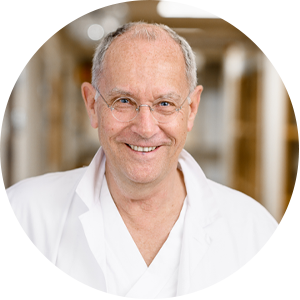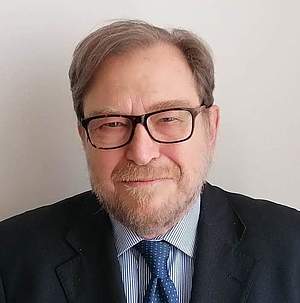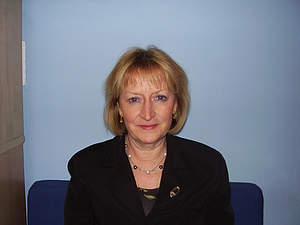Moritz Romberg Lecture - Awardees
Marina A.J. de Koning-Tijssen
Moritz Romberg Award Lecture
Myoclonus, you need to know it to see it
Marina A.J. de Koning-Tijssen is a neurologist and researcher in movement disorders. Since 2012, she has been Professor of Neurology at the University Medical Centre Groningen (UMCG) and Chair of its Expertise Centre for Movement Disorders, which is part of the European Reference Network for Rare Neurological Disorders (ERN-RND).
She trained in neurology at Leiden University, where she completed her PhD on Hyperekplexia. Afterward, she worked as a neurologist in Amsterdam before moving to Groningen. During her studies, she also spent time at Johns Hopkins University in the USA and the Institute of Neurology in London, UK.
Her research focuses on jerky movements and dystonia, with a particular emphasis on integrating clinical, neurophysiological, and imaging data through machine learning techniques. Her current project, Next Generation Phenotyping – The Next Move in Movement Disorders (NEMO), aims to better classify movement disorder phenotypes. She has received multiple prestigious grants for this work, including funding from the European Regional Development Fund, ZONMW-Top, and NOW-TTW.
In 2024, she received the Stanley Fahn Presidential Lecture Award from the International Parkinson and Movement Disorder Society. Prof. de Koning-Tijssen has held several European leadership roles, including Chair of the clinical line for the European COST platform Dystonia, and WP leader in the ERN-RND. She is currently Secretary of the International Parkinson and Movement Disorder Society.

Prof. Nils Erik Gilhus
Moritz Romberg Lecture
Myasthenia gravis; individualized treatment based on a well-defined disease pathogenesis
Nils Erik Gilhus has been a Professor of Neurology at University of Bergen, Norway since 1987 and a consultant neurologist at Haukeland University Hospital since 1986.
He was previously Faculty Dean, Head of Department, leader of the Norwegian Neurological Association, NevroNor, and founded the Norwegian Brain Council. Gilhus has published more than 400 scientific papers, mainly on neuroimmunology, neuroepidemiology, neurorehabilitation, and mother-child health, centred on myasthenia gravis and epilepsy.
He has supervised more than 30 accomplished PhDs and been a partner in 6 EU research projects, coordinating three of them. He was an EFNS and ESNI Board Member, leader of the EFNS Scientific and the EFNS Congress committees, and he is now a fellow and individual delegate of EAN.

Prof. Mary M Reilly
Moritz Romberg Lecture
The continuous circle of translation
Mary M Reilly, Centre for Neuromuscular Diseases and Dept. of Neuromuscular Diseases, National Hospital for Neurology and Neurosurgery and UCL Queen Square Institute of Neurology, London WC1N 3BG, UK.
Mary M. Reilly graduated from University College Dublin in 1986 and received her MD in 1996. She leads the peripheral nerve clinical and research group and is head of the Division of Clinical Neurology at UCL Queen Square Institute of Neurology. She runs a research programme on the inherited neuropathies encompassing gene identification, pathogenetic studies, natural history studies, development of outcome measures and conducting clinical trials. She is a Past President of the Association of British Neurologists (ABN), a past President of the British Peripheral Nerve Society (BPNS), and a past President of the international Peripheral Nerve Society (PNS). She was elected a Fellow of the Academy of Medical Sciences in 2020.

Prof. Bo Norrving
Moritz Romberg
“Stroke systems and systematics”
Bo Norrving is a senior professor of neurology at Lund University. His activities span more than four decades and his 600+ publications include pioneering clinical trials, clinical-imaging correlations, epidemiology, and development of stroke services. He was the first Editor-in-Chief of the European Stroke Journal, he served as president of the World Stroke Organization from 2008 to 2012, and he has represented stroke clinicians and researchers at the WHO and the UN. He also chaired the revision work of the cerebrovascular section for the ICD 11.

Gábor M. Halmágyi, Sydney, Australia
Moritz Romberg Lecture
"Romberg and his famous test - what more do we know 170 years later?"
Romberg and his famous test - what more do we know 170 years later?
Professor Halmágyi was born in 1947 in Szeged, Hungary. He attended medical school between the years 1964-1976. During these years he specialised in internal medicine then undertook general neurology training in Sydney. Between years 1977-1979 he worked in National Hospital for Nervous Disease, Queen Square in London, UK. He was awarded neuro-otology research fellow with Dr MA Gresty in MRC Hearing and Balance Unit (founded by Dr CS Hallpike) and also fellow in clinical neuro-otology (Dr MR Dix), in clinical neuro-ophthalmology (Dr MD Sanders) and clinical neurology (Prof WI McDonald).
Since 1980, he is staff neurologist at the Royal Prince Alfred Hospital, Sydney and clinical professor, University of Sydney. In 1990 he founded the Neuro-otology Society of Australia. Later on, in 1996, he was awarded Hallpike-Nylen Prize of the Bárány Society. In 2012 he received Officer of the Order of Australia. Among his main research interests are: measurement of human vestibular function and the pathophysiology of pseudotumor cerebri. His main innovative research findings are: Head impulse testing of semicircular canal function (from Arch Neurol 1988;45:737 to Front Neurol 2020;11:732); Vestibular evoked myogenic potentials as a test of dynamic otolith function (from Neurology 1992; 43:1635 to Front Neurol 2020;11:580); C) Conjugate ocular torsion and subjective visual horizontal as a test of static otolith function (from Ann Neurol 1979;6:80 to Acta Otolaryngol 2020;140:833); D) Cerebellar Ataxia Vestibular Areflexia Syndrome (CANVAS) (from Brain 2004;127:280 to Otol Neurotol 2021 Jan 22); (E) mechanism of pseudotumor cerebri and its treatment with transverse sinus stenting (from Arch Neurol 1991;48:740 to J Neurointerv Surg 2016;Oct 8:e41).

Giorgio Cruccu, Rome, Italy
Moritz Romberg Lecture
Pain and neurologisits: never too late
Professor of Neurology
Department of Human Neuroscience, Sapienza University
Rome, Italy
Dr Cruccu obtained his degree in Medicine and Surgery at the University of Genoa, Italy, in July 1975 and specialized in Neurology at the Sapienza University of Rome in July 1979.
Former Head of the Department of Neurology and Psychiatry (2012-2018), he currently holds the following positions at the Sapienza University of Rome:
- Full Professor of Neurology at the Department of Human Neuroscience
- Chairman of the Neurology teaching course for the degree in Medicine
- Chief of the Clinical Neurophysiology Division and associated Neuropathic Pain Centre
Dr Cruccu’s special research interests include the neurophysiology of pain and the human trigeminal system. As an 18 year old student he entered the neurophysiology laboratory to work on the rabbit limbic system at the Institute of Physiology at Genoa University. After graduation he attended the neurophysiology laboratory working on the cat peripheral nerve and spinal cord at the Neurological Institute of Sapienza University of Rome. Winner of a NATO senior fellowship in 1984-85 he attended the Pain Relief Foundation in Liverpool, undertaking intraoperative intracranial recordings in patients with trigeminal neuralgia. In recent years he has predominantly dedicated to nociceptive reflexes and cortical evoked potentials after laser stimuli in patients with trigeminal neuralgia, postherpetic neuralgia, and diabetic neuropathy. His latest efforts focused on gathering European scientists to produce European guidelines on neuropathic pain.
Dr Cruccu has written several book chapters and more than 300 articles in ISI-ranked international journals, which have received more than 15,000 citations for an H index of 60 (Scopus and ISI Web of Science).

Pamela Shaw, Sheffield, United Kingdom
Moritz Romberg Lecture
Translational Neuroscience to improve outcomes for motor neuron disease. Are we winning?
Professor Dame Pamela Shaw, Professor of Neurology and Vice President and Pro-Vice Chancellor for the Faculty of Medicine, Dentistry and Health at the University of Sheffield and Founding Director of the Sheffield Institute for Translational Neuroscience (SITraN), one of the world-leading centres for motor neuron disease (MND) research. She is also Director of the Sheffield NIHR Biomedical Research Centre for Translational Neuroscience. The work of her team is focused on investigating molecular mechanisms of motor neuron injury and new therapeutic approaches in MND, both for neuroprotection and improved symptom management. Key recent achievements include: identification of new genetic subtypes of MND; improvements in symptomatic management of MND including non-invasive ventilation and the HeadUp collar; identification and implementation of new therapeutic targets for MND including evaluation of novel drug and gene therapy approaches and the development of innovative pre-clinical model systems for screening of therapeutic agents.
Watch the interview with Pamela Shaw here

Jes Olesen, Copenhagen, Denmark
Moritz Romberg Lecture
Migraine mechanisms and new drug targets
Professor Olesen is Professor of Neurology, dr.med. (Copenhagen, Denmark), dr. hon.c. (Rome, Italy), dr. hon.c.(Yekaterinburg, Russia), and fellow of the Royal College of Physicians (FRCP). Born on 9.9.1941 in Hobro, Denmark, Jes Olesen received his MD at the University of Copenhagen 1967. Further specialist education in neurology at major teaching hospitals in Copenhagen, the National Hospital, Queen Square, London, and the Cornell Medical Center, New York. Consultant neurologist at Gentofte Hospital 1985-1993, Glostrup Hospital 1993- . He is the founder Danish Headache Center 2001-Previous Associate Editor of Cephalalgia and Pain. He was Editorial board member of several journals and President of several Organisations, such as the Danish Headache Society, Scandinavian Migraine Society, International Headache Society, Danish Stroke Association, Year of the Brain 1997 campaign, European Federation of Neurological Societies (EFNS) and European Brain Council (EBC). Honorary member Australian, German, Austrian and International headache societies and of the Austrian, French, British, German and Polish Neurological Societies and of European Federation of Neurological Associations (EFNA) and EAN (as former EFNS President). He received the Great Nordic Research Prize of the Lundbeck Foundation and many other national and international prizes. Citations: Google Scholar 50673 H-Factor: Google Scholar 113, i/10-index: Google Scholar 539. 525 articles in refereed journals, 235 book chapters, 33 books. Has supervised 16 doctoral and 25 Ph.D. dissertations.

Christian E. Elger, Bonn, Germany
Moritz Romberg Lecture
Epilepsy: Where do we stand? Where are we headed?
Prof. Christian E. Elger is Professor of Epileptology and director of the department of epileptology at the University of Bonn, Germany. The epilepsy center has one of the most active epilepsy surgery programs within Europe. Dr Elger is renowned for his role in studying seizure prediction and his work within the field of epilepsy and cognition. He helped develop pre-surgical evaluation techniques which enable the prediction of postsurgical cognitive outcome. His vision helped found the Center for Economics and Neuroscience in Bonn. He is widely published in highly-ranked journals and has also served as Associate Editor for Brain and Epilepsy and Behavior. In 2005, Dr. Elger received the Zülch Prize from the Max-Planck-Foundation for his scientific studies in experimental epilepsy research and cognition. The ILAE (International League Against Epilepsy) granted him the Ambassador of Epilepsy award. In 2010, he received the Hans-Berger Award of the DGKN (Deutsche Gesellschaft für Klinische Neurophysiologie und Funktionelle Bildgebung) for merit within the field of electrophysiology in epilepsy. He was presented with The Victor and Clara Soriano Award at the 20th World Congress of Neurology Meeting in Marrakesh in 2011 and in 2012, the ILAE granted him the European Epileptology Award. In 2015, he received the William G. Lennox Award from the American Epilepsy Society.
Watch the interview with Christian E. Elger here

Eduardo Tolosa Sarro, Barcelona, Spain
Moritz Romberg Lecture
The prediagnostic phase of Parkinson's disease
Prof. Eduardo Tolosa, earned his MD degree from the University of Barcelona, Spain. His neurological training was obtained at the University of Minnesota Hospital in Minneapolis. He was visiting scientist at Brookhaven National Hospital, between 1974 and 1975, and, subsequently, he joined the faculty of the Department of Neurology at the University of Minnesota. He was later appointed chief of neurology at the University Hospital in Barcelona in 1982. Prof. Tolosa was certified as a neurologist by the American Board of Neurology and Psychiatry in 1976 and became a fellow in 1997.
He is a founding member of the Movement Disorder Society (MDS). He has been president of the MDS and president of the ENS. Prof. Tolosa is an honorary member of several neurological societies, including the British Neurological Association and the French Neurological Society.
Field of research: movement disorders and particularly in issues related to experimental therapeutics, etiology and pathophysiology of various parkinsonisms. His team has investigated the clinical and molecular genetics of Parkinson’s disease and progressive supranuclear palsy. In the areas of experimental therapeutics, Prof. Tolosa was involved in pioneer studies defining mechanisms underlying levodopa-related motor fluctuations, both in patients and in pre-clinical models of parkinsonism. His team has been among the first in Europe to evaluate efficacy of novel surgical strategies for Parkinson’s disease such as subthalamic nucleus stimulation and its impact upon patients cognition and quality of life. In addition, during the last years, he has dedicated his investigations to the study of the asymptomatic individuals carrying PD-causative mutations in the LRRK2 gene.
